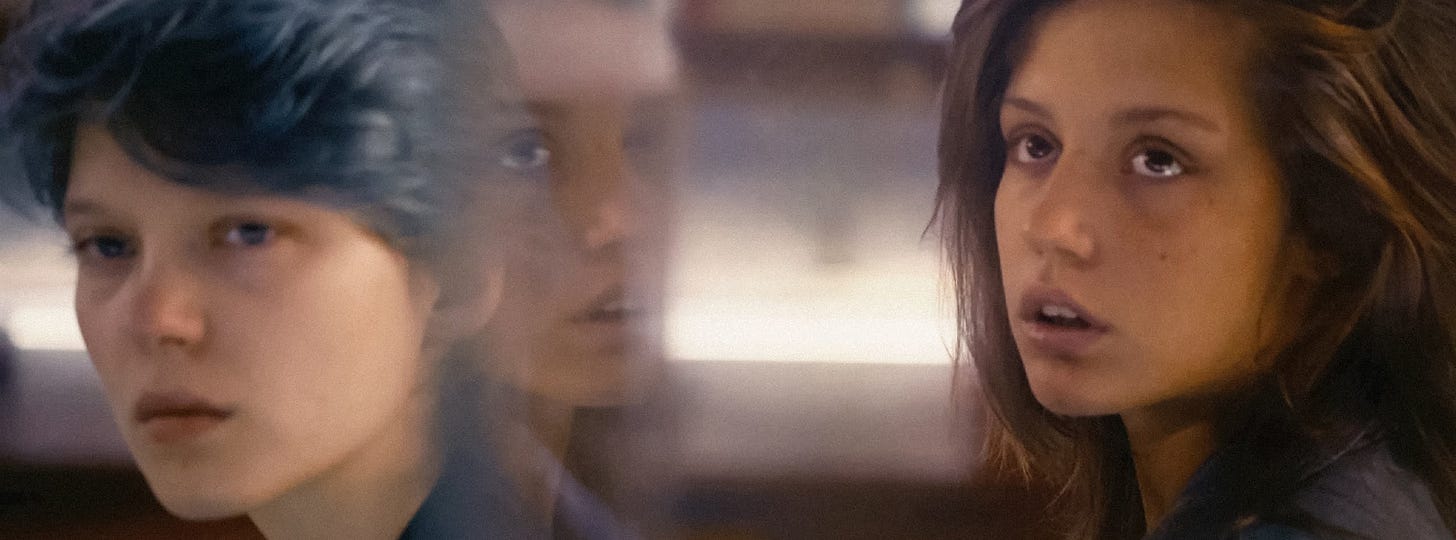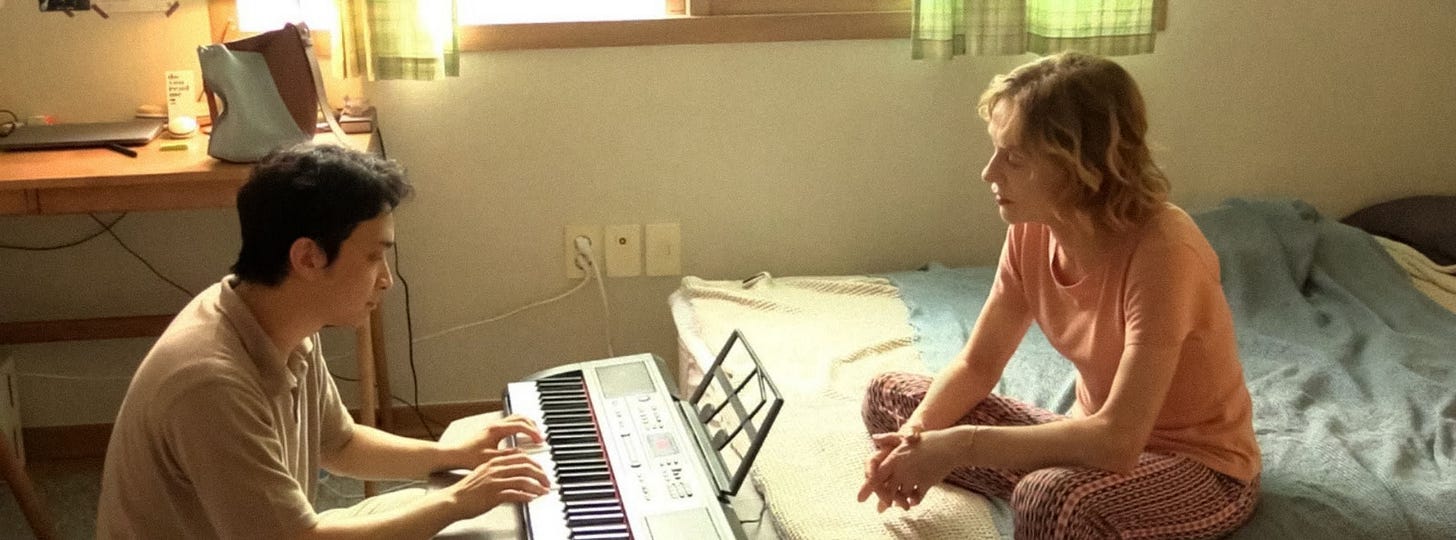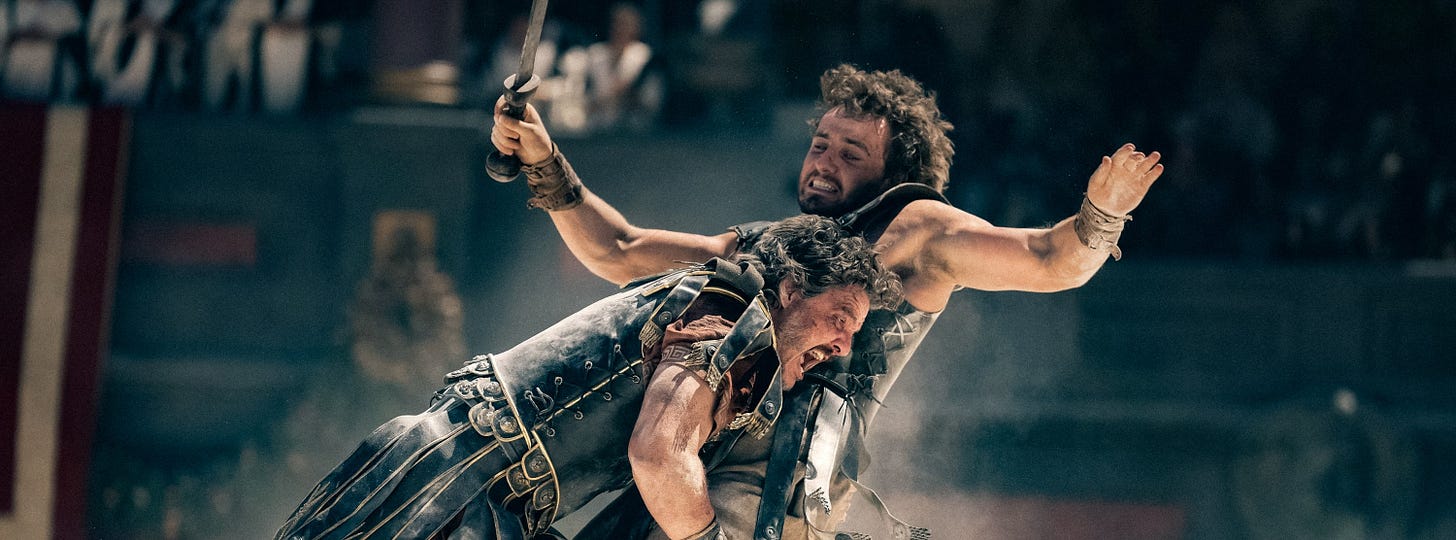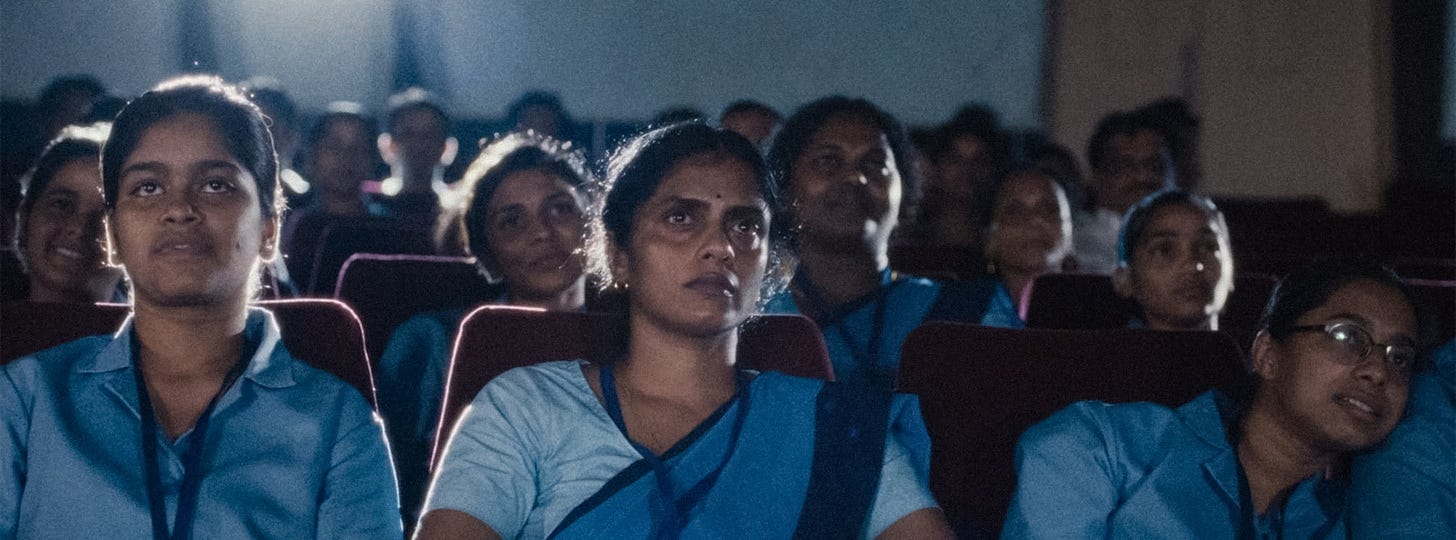What I Watched and Rewatched: Nov. ‘24
It was the best of times, it was the worst of times. Okay, maybe more “worst” than “best,” and movies were my semi-escapism amidst the chaos.
What a weird time to be watching movies. Not because of anything that’s happened in the film industry per se; we’ve had plenty of discourse-charged films released this month, and the domestic box office is technically at its healthiest since the “Barbenheimer” phenomenon over a year ago. But after the election, I did temporarily—and I guess I still am, just to a lesser degree—wonder why I was watching movies. Not to veer this sharply into politics, and I didn’t take Donald Trump’s presidential win as hard as others I know, but that day onwards was filled with momentous dread. I couldn’t help but wonder if I’m wasting my time.
It’s interesting to see how Hollywood has reacted to Trump’s second presidential win compared to the first. At first, if you remember, there was a seismic shift in how the Academy—and the movie-going audience, as a whole—consumed cinema. Barry Jenkins’ Moonlight (2016) won Best Picture over Damien Chazelle’s La La Land (2016), and people wanted art and movies to mean something, to say something about the contemporary world. This time, things feel more defeatist; instead of confronting things head-on, it appears we’re looking for escapism. That perhaps explains the whole narrative of Wicked being a legitimate Best Picture contender; people want an insertion of politics within the veneer of something “hopeful.”
I don’t like that attitude personally, but I’d be lying if I wasn’t indulging in such an “attitude.” Movies are, in some ways, inherently escapist. Am I that character in Children of Men (2006) who tells Theo that he copes with the current state of the world by saying, “I just don’t think about it?” Not to keep blabbering, but I found Jackson Krueger’s video surprisingly fulfilling, and that’s where I made my peace with the issue.
To set a few guidelines for what films qualify for this post: (1) they must’ve been viewed between November 1st and November 30th; (2) Films reviewed or soon-to-be reviewed by me in outside publications, such as The Statesman, will not be included here. Consequently, Wicked is on the chopping block. (3) All these reviews are ripped straight from my Letterboxd account. Alright, here’s the rundown.
No Other Land (2024, Basel Adra, Rachel Szor, Hamdan Ballal, and Yuval Abraham)
[Nov. 1st, 2024; 86/100:] A documentary that wholly understands the power of images, and it’s not just the unflinching moments of people getting ruthlessly shot, houses getting bulldozed, and the endless mountains of rubble that leave a permanent mark in your brain. (For clarification, I’m trying not to be dismissive of those moments as they do create an extremely potent visceral reaction, but No Other Land is far more than informative shock value, and calling it “informative shock value” feels extremely dismissive of its humanity.) Instead, it’s shots of a television suspended in a cave, disorienting shots of the jagged ground with the cameraman franticly running for his life, or Basel playing with tiny rocks on the ground out of presumed exhaustion and defeat that stuck with me the most. Even the opening sound of Basel’s digital handheld camera—as he’s loudly breathing with exhaustion after minutes of off-screen running, zooming the lens closer to its subject—is distinctively memorable. But amidst the senseless destruction and violence, images of Basel’s psychological and mental exhaustion hold immense emotional weight. He seeks fleeting escapism from whatever, whether that’s scrolling on his phone, smoking, or sleeping, and his discussions with Yuval about his reluctance to have children because he doesn’t want to raise his children in such an unstable, unforgiving world really tugged something inside me. For some reason, while watching, I immediately thought of that one line in First Reformed (2017), “Will God forgive us for what we’re doing to his creation?” Basel tells Yuval while driving that he needs to be patient, but is it “patience” or a kind of bleakness only driven by the seemingly unrealistic hope and urgent need for a better future?
Blue Is the Warmest Colour (2013, Abdellatif Kechiche)
[Nov. 6th, 2024; 49/100:] Before we address the elephant in the room, here are some other reasons Blue Is the Warmest Colour isn’t so good. As someone who has grown more sensitive to directorial style, I found Abdellatif Kechiche’s preference for these tight, handheld-riddled shots excessively uninteresting in their repetition. (I don’t know if that’s a case of selective memory since the film occasionally gives some distance to its subjects with the occasional medium and wide shot, but my brain registers so much of Kechiche’s composition as the same.) It’s not that the directorial choices are “bad” per se—the mise-en-scène is sound, there’s some implementation of color theory, and Kechiche gives his actors enough room to execute the occasional emotional beats—but it’s otherwise pretty blandly stylized arthouse with a hyper-indulgent hubris. I read aflickering’s review, which aptly says, “I spent a lot of this thinking, ‘That was pretty nice, but it could’ve been more creative, stranger, riskier, subtler, clearer, etc.’” I think the only time the narrative’s emotional rawness connected full-swing for me was when Emma gets Adèle to confess her infidelity, but that’s only because Adèle still looks like a child—and the film so poorly communicates multiple years’ worth of time passing—that her experiencing such unforgiving emotional trauma from her considerably older lover felt genuinely toe-curling.
Okay, now might be a good time to address this. For the record, I’m one of those people who would advocate for more sex scenes in movies or at least a destigmatization of sex in media. Where Blue Is the Warmest Colour goes horribly wrong is its cinematic voyeurism. There’s something crude about seeing the film and Kechiche’s camera at its most emotionally and psychologically detached whenever Emma and Adèle have sex, and that’s what makes the excruciatingly long sex scenes where the camera so shamelessly relishes every slap to the ass, pussy eating, and scissoring session quite unmistakably male-gazey. (I don’t buy the “slice-of-life hyper-realism” argument one bit here.) Kechiche’s obsession with the woman’s ass and lesbianism is probably the only way straight men are content with seeing sex on screen, distanced from actual emotional intimacy that you can project whatever sexual fantasy you want onto it. And considering Kechiche’s subsequent work and that dropped sexual assault allegation, it’s hard not to feel there are some underlying sinister intentions to the whole thing.
Don’t Look Up (2021, Adam McKay)
[Nov. 7th, 2024; 43/100:] I felt the urge to revisit this after this year’s election; amidst a lot of Democrats, at least in my opinion, completely misunderstanding what went wrong, Adam McKay’s tweets certainly don’t give off the vibe of “the neo-liberal version of God’s Not Dead (2014).” I’m admittedly fascinated by this movie, looking back. You can feel McKay’s anger unabashedly transferred onto the screen. While I initially read the movie to be “insultingly allegorical to climate change,” and still do, I’m more attracted to Meryl Streep’s rendition of a female Trumpian baddie. She’s cartoonishly evil, with her very own Elon Musk-esque tech-billionaire by her side, as if the movie is screaming from a loudspeaker, “How did we let Trump happen?” (Not once, twice now.) It’s admittedly very self-affirming to liberals—and maybe I’m giving it too much credit, considering how Don’t Look Up exaggerates its antagonists into condescendingly manufactured caricatures to maximize one’s “feel-good” anger—but it’s hard to feel good about yourself when you’re watching something so utterly cynical. Not that McKay has never been a cynic of the American capitalist system, but he literally frames his complete defeatism into the scale of a world-ending apocalypse. (The post-credit scene ruins some of that intended effect. For someone so insistent on making something so “feel-bad” bleak, it should’ve ended with all the billionaires escaping the end of the world.) However, it’s a shame that such unsubtle, Network-homage-riddled (1976) frustration operates under some horrendous filmmaking. Again, this isn’t particularly “new,” but this movie has some of the worst editing I’ve ever seen from any film. Maybe McKay should stay tweeting. Or maybe make some video essays, I don’t know.
The Sweet Hereafter (1997, Atom Egoyan)
[Nov. 9th, 2024; 93/100:] Perhaps I’m a complete sucker for Russell Banks’ literary work—circle to Affliction’s (1997) bitter examination of generational trauma and masculinity—but I can’t imagine many auteurs, not even Paul Schrader, who could’ve wielded the same mysterious, striking aftertaste that The Sweet Hereafter possesses, which I almost entirely credit to Atom Egoyan’s ingenious narrative construction. Granted, the premise of small-town suburbia hiding a deeper, darker underbelly of secrets isn’t a novel concept; David Lynch practically mastered and explored every nook and cranny of this concept back in the late-‘80s with the success of Blue Velvet (1986) and Twin Peaks (1989). Still, there’s a genuine edge-of-your-seat quality to how this film, in particular, unravels information, with Egoyan placing the subjectivity of the accident and the spectrum of responses front and center. (And I admire how The Sweet Hereafter deliberately doesn’t make a cinematic spectacle of the event itself, which would’ve distracted us from its humanity.) Sometimes, the hardest truth to accept is that things happen for reasons we’re never meant to know, and never has a film’s closing shot and its closing words so appropriately matched its intended atmosphere of grievance-riddled confusion. In the words of Sarah Polley’s phenomenally realized character, “Everything was strange and new.”
Gladiator (2000, Ridley Scott)
[Nov. 22nd, 2024; 79/100:] Revisiting in preparation for Gladiator II, and seeing such a cinematically apt closure—that a heroic death transcends one’s lifetime, that Juba is not only “free” in a literal sense but a metaphorical sense from his grief—makes me wonder what exactly will be Ridley Scott’s narrative throughline to justify transforming this film into intellectual property. (Also, in a time of increased global authoritarian fascism, it’s interesting to register the timeliness of its political subtext the second time around.) However, I’d be lying if I said Gladiator didn’t take its time to win me over, with that beginning act comfortably being its weakest juncture. Admittedly, the grandiose tactility of the opening battle sequence is audiovisual eye candy, but it’s impossible not to be distracted by its horrendous, whiplash-inducing editing. The film’s unreasonable insistence on interjecting every action scene with clunky slow-mo completely ruins the scene’s rhythm, and that’s scattered all over Gladiator’s runtime. (And don’t get me started on the director’s cut. That opening battle sequence has some awful, awful editing; the slow-mo fucking up the film’s editing rhythm is so apparent that I had to switch to watching the theatrical cut on my computer.) It was only until the scene of Joaquin Phoenix’s Commodus murdering his father that the movie grabbed my attention. And, no shade to Russell Crowe—he has the movie-star, blockbuster physicality necessary to sell this character—but Pheonix genuinely runs circles around everyone. Every line is so convincingly delivered with the right amount of cartoonish, pathetic evil; I’m genuinely surprised and a little baffled that Crowe, not Pheonix, earned the movie’s lone acting Oscar.
A Traveler’s Needs (2024, Hong Sang-soo)
[Nov. 23rd, 2024; 48/100:] A Traveler’s Needs, for whatever reason, is my introduction to Hong Sang-soo, and, unfortunately, this was a slog-and-a-half to sit through. It was like foreigner-cultural voyeurism within the framework of gruelingly bland mundanity. The doubling element of Iris’ two clients briefly piqued my interest, as my mind went, “Wait, isn’t that the same answer as the other client?” But, as things dragged on, my enthusiasm quickly fizzled back to general disinterest when I couldn’t find any particular narrative nor directorial intention to this faux-wannabe French teacher beguiling her clients to say the same things word-for-word. It’s only around the last half-hour—when Sang-soo injects a strange roommate situation into the film’s narrative—that things get interesting. There is a thorny quality to seeing the roommate’s mother confront him about the absurdity of developing a sort of “romance” with someone he doesn’t know. (“Thorny” because this is how my mother, who is also Korean, would react if I did something she very strongly didn’t approve of.) But then we reached the movie’s final sequence, which left me completely stupefied. It’s as if the roommate hadn’t learned his lesson, and, in a decision made off-screen, his relationship with Iris—whom I failed to register her supposed allure—will continue to fulfill some semi-undisclosed purpose. Not that such a thing is remotely implausible, but why? We’ll never really know.
Gladiator II (2024, Ridley Scott)
[Nov. 23rd, 2024; 69/100:] Similar to my experience with the original, perhaps to a greater degree of wearisome dread, Gladiator II starts on the wrong foot. (Even the phrase “starts on the wrong foot” feels like an enormous understatement; I thought it was veering towards something genuinely disastrous after the first 20 minutes.) The opening battle sequence, especially, has Paul Mescal pretty severely miscalibrating his pep-talk speech; granted, that might be intentional, but it’s a questionable choice to frame him as an unconvincing leader—which he is to start the film, as he looms under the shadow of Russell Crowe—only for the audience not to bear full witness to an actual first-act arc where he develops this “rage” or a grander transformation and self-actualization from a reluctant cynic to the leader Rome needs. Part of that comes from the numerous misfires in the screenplay—why not start the flashback sequences to let the audience grasp Lucius’ abandonment? (Plus, it makes everything less narratively disorienting.)—but that’s also a product of Gladiator II functioning more like an ensemble piece with numerous subplots holding similar significance with each other. Denzel Washington’s Macrinus is its most fascinating character, scheming his way to the top, a sort of heinous rendition of the “Roman Dream,” like the “American Dream,” coming to fruition. However, I think he is the character that could’ve used a little more obfuscation; blurring his true motivations would’ve done him and the movie wonders. Still, Mescal hits the mark on most of his monologues; there’s a gripping physicality to the action despite losing its tactility with some computer-generated slop and digital filmmaking; I wound up wholly satisfied and entertained by the end product. It’s no Top Gun: Maverick (2022), but at least it’s no Joker: Folie à Deux.
All We Imagine as Light (2024, Payal Kapadia)
[Nov. 23rd, 2024; 68/100:] Payal Kapadia creates some unmistakably strong, meditative arthouse that shares a few shades with ‘90s Wong Kar-wai, but—and I’m going to sound like an attention-deprived hog here—there should’ve been more omnipresent narrative throughline to aid an otherwise not-so-well-paced film. Also, I don’t want this to come off the wrong way, but this is one of those instances where my idea of the film grips me more than what Kapadia strives for. All We Imagine as Light begins with an urban portrait of contemporary Mumbai; the opening is somewhat reminiscent of Mike Mills’ implementation of these interviews of children talking about the future in C’mon C’mon (2021), and that’s the sequence that sticks with me the most. It plays somewhat like a love letter to the city while understanding and highlighting the patriarchy and classism that are nonetheless fundamentally rooted in city culture. (An anonymous woman, in particular, says something along the lines of, “I recently got my heart broken ... but it’s easy to forget about it when you live in a city.”) But, when the film exits its urban setting, fully stating its sociopolitical thesis by the second act, the mixed registers increase tenfold. I like the injection of some magical realism—the film sorely needed an additional layer of intrigue—but I was surprised that so many people’s immediate takeaway from the film was to ponder if the middle-aged man Prabha rescues was her husband. (Frankly, I didn’t think much of it. Originally, I came to the bizarre conclusion that the sequence was supposed to signify some doubling between Prabha and Parvaty.) Fortunately, the strong ending negates some of my gripes, but I doubt I’ll find something revelatory on a revisit.
The Seed of the Sacred Fig (2024, Mohammad Rasoulof)
[Nov. 29th, 2024; 83/100:] Beforehand, I knew this film was surprisingly divisive amongst my circle and wanted to know which side of the spectrum I’d land on. A man I met at the New York Film Festival raved about it and said it was one of his favorites despite its mainstream sensibilities; others, mostly critics I follow, thought it was unchallenging to Western audiences to whom The Seed of the Sacred Fig is “made for.” I’m unsure if I agree with the latter statement, but I understand why they feel this way. This is unabashed cinema of contemporary political awareness; if you fundamentally disagree with Mohammad Rasoulof’s thesis regarding the corruption and oppressive nature of Iranian authoritarian theocracy, I doubt this will change your mind. The father’s transformation from a man conflicted about the morality of his privileged position—or the lack thereof—to someone genuinely heinous who would sacrifice his family to preserve his position of power felt like, in the words of Mike D’Angelo, a tool of misdirection rather than actual character complexity. (It doesn’t help that the film’s last hour, arguably the most gripping, formally throbbing portion of the movie—seriously, the person behind me apparently looked as if he was about to get a heart attack because the horror-thriller element is so emotionally gripping—dilutes itself a little and becomes thematically one-note.) It’s a one-sided examination of the Iranian regime and its systematic patriarchy, but intentionally so, since Rasoulof implies that such differences in worldview are genuinely irreconcilable and result in a paranoid, fractured society. Such reading, in particular, alleviates much of my concerns that this will be “unchallenging to Western audiences” because the internal roots of this familial conflict are fundamental to the human condition. I also read much of the domestic conflict as a generational one instead of a patriarchal one—which can be attributed to my background studying journalism—whether that’s communicated through the conflict between the conservative elders and the rebellious youth or, more glaringly, the distinction in consumption between broadcast news and social media. “The world is changing,” the mother says.











